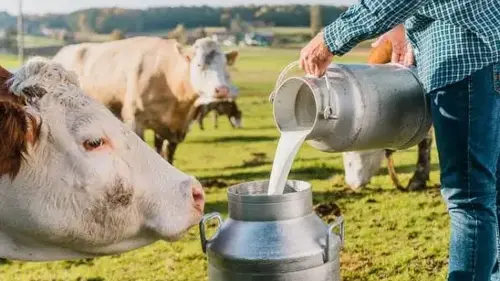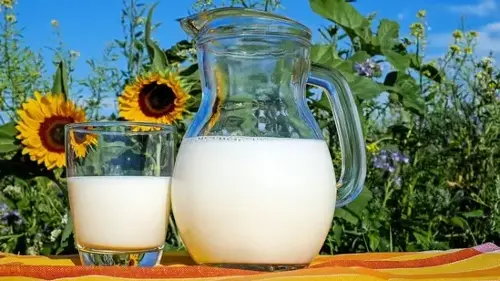
The raw food movement has long championed the benefits of eating fresh, unprocessed foods but when it comes to raw milk, the conversation takes a more complicated turn. Despite its growing popularity, raw (unpasteurised) milk is now at the center of a public health debate — one that is intensified with the discovery of bird flu in milk samples across the US.
So, is raw milk a superfood or a silent risk? The latest research suggests that many Americans may not fully understand the dangers involved. [Also read: Almond, oat, soy: Which plant-based milk is best for you?]
The bird flu connection: What you need to know
In April 2024, the FDA detected the H5N1 bird flu virus in raw milk samples from four states and since then, the virus has been found in commercially sold raw milk as well. While no cases of bird flu have been directly linked to raw milk consumption, the findings have raised alarm among health experts.

By early 2025, the CDC confirmed 70 cases of H5 bird flu in humans across 13 states, primarily among those in close contact with infected poultry or dairy herds. Tragically, one person in Louisiana died, though there is no evidence yet of human-to-human transmission.
The impact on animals has been even more severe, with over 166 million poultry and wild birds affected nationwide. Despite these concerns, a recent survey from the University of Pennsylvania’s Annenberg Public Policy Center (APPC) shows that many Americans remain unaware of the risks associated with raw milk.
The raw milk knowledge gap
The survey paints a worrying picture:
- Only 56% of adults know raw milk is less safe than pasteurized milk. The rest either aren’t sure (25%), think it’s equally safe (12%), or wrongly believe it’s safer (6%).
- Only 17% of Americans know bird flu has been found exclusively in raw milk. Most (68%) are unsure, while others incorrectly think it has been found in pasteurized milk.
- Two-thirds (66%) of people don’t know that children face greater health risks from raw milk than adults do.
One of the most pressing misconceptions is that raw milk is a more nutritious alternative. While 28% of Americans believe raw milk has more nutrients than pasteurised milk, the FDA states that pasteurisation kills harmful microorganisms without significantly affecting milk’s nutritional quality.
Health claims vs science
Raw milk advocates often cite a range of health benefits but how do these claims hold up against scientific research?
- Raw milk does not prevent osteoporosis – While 26% of people correctly recognize this, 10% wrongly believe raw milk is more effective than pasteurized milk at strengthening bones.
- Raw milk doesn’t cure lactose intolerance – 10% of people mistakenly think it does, while 50% aren’t sure.
- Raw milk doesn’t reduce asthma symptoms or boost the immune system – Yet, 23% still believe it enhances immunity.
Another major concern is foodborne illness. Only 32% of people recognise that drinking raw milk increases the risk of infections from bacteria like Salmonella, E. coli, Campylobacter and Listeria. These pathogens can cause severe illness, especially in children, pregnant women and those with weakened immune systems.
The debate over regulation
Raw milk is a hot-button issue when it comes to government oversight. While the FDA banned interstate raw milk sales in 1987, 30 states still allow some form of raw milk sales. Public opinion is divided:
- 24% support allowing interstate raw milk sales, while 28% oppose it.
- 32% believe federal regulations on raw milk are unnecessary government intrusion.
- 25% think state bans violate sellers’ constitutional rights, while 34% disagree.
- 56% support warning labels on raw milk, while 14% believe they infringe on sellers’ rights.
These mixed views highlight the challenge of balancing individual choice with public health concerns.
Can bird flu spread through raw milk?
While no human cases of bird flu have been definitively linked to raw milk consumption, recent research raises concerns. Scientists have found that mice can contract H5N1 from drinking infected raw milk, leading health officials to warn that humans could be at risk.

Pasteurisation, however, effectively kills the virus if present. Beyond bird flu, raw milk has a long history of carrying harmful bacteria. Outbreaks linked to raw milk have caused severe illness and hospitalisations, prompting health experts to emphasize the importance of pasteurisation.
Should you drink raw milk?
While raw milk has passionate supporters, the science is clear: it carries greater health risks than pasteurised milk. The recent detection of bird flu in raw milk samples adds another layer of concern, reinforcing the need for caution.
If you are considering raw milk, it is essential to weigh the risks carefully. For parents, in particular, understanding that children are more vulnerable to foodborne illnesses is crucial. As research continues, one thing remains certain—knowledge and awareness are key to making informed choices about what we consume.
Note to readers: This article is for informational purposes only and not a substitute for professional medical advice. Always seek the advice of your doctor with any questions about a medical condition.